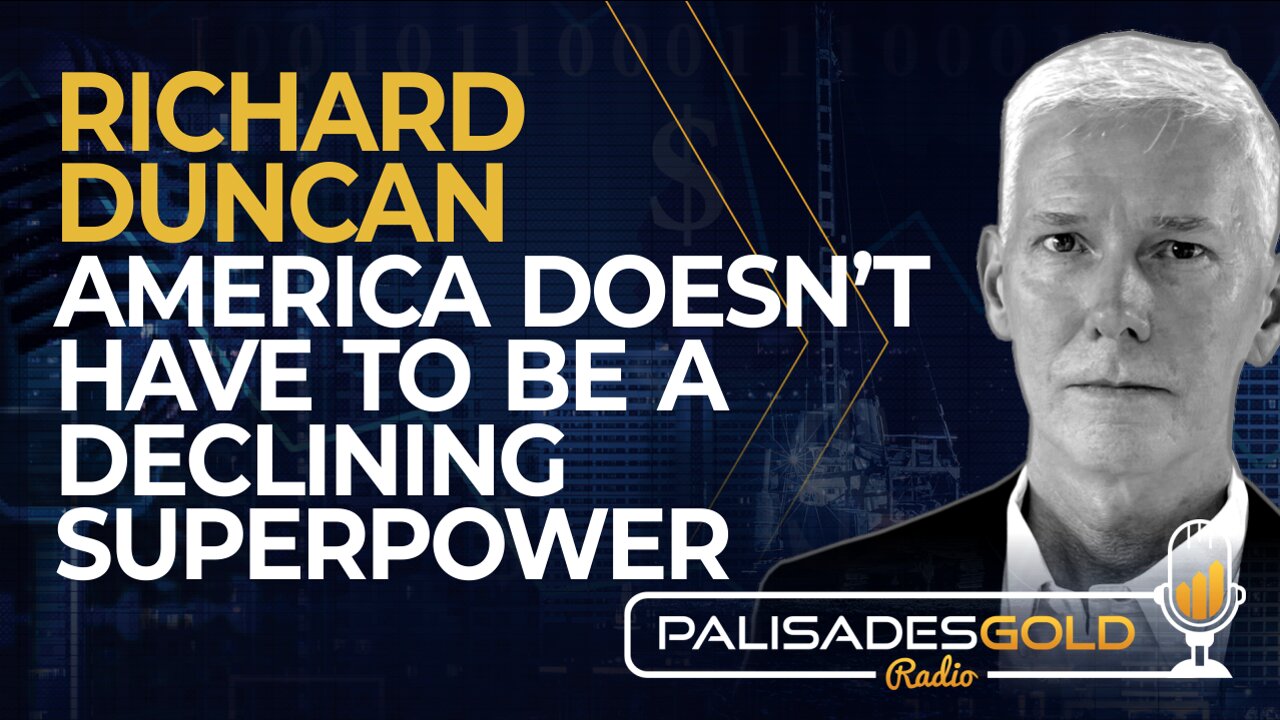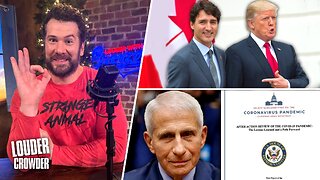Premium Only Content

Richard Duncan: America Doesn't Have to be a Declining Superpower
Tom welcomes back Richard Duncan, economist and author of 'The Money Revolution.' The discussion revolves around the implications of Duncan's latest work, which challenges conventional economic theories, particularly those rooted in Austrian economics. Their last conversation was over two years ago.
Duncan begins by recapping the ideas presented in his book, including how the unexpected response to the 2008 financial crisis, characterized by trillions of dollars in fiscal stimulus and monetary expansion, did not result in high inflation despite concerns from Austrian economists. He also highlights the shift away from a gold standard and its consequences, such as altered constraints on money creation, government borrowing, and trade deficits.
Furthermore, Duncan discusses the impact of these changes, including increasing income inequality and implications for inflation and wealth growth. The conversation also touches upon the economic environment shaped by the pandemic and its unprecedented fiscal and monetary stimulus measures, which led to high inflation rates.
Despite concerns about high inflation, the economic recovery led to significant wealth growth, enough to pay off the national debt with some money left over.
They discuss the implications of the stimulus and the lingering effects it continues to have on the economy. Richard is a proponent of establishing a sovereign wealth fund for the United States to finance investments in new industries and technologies, such as artificial intelligence, nanotech, biotech, fusion, quantum computing, and genetic engineering. The U.S. currently invests half as much in research and development compared to decades ago, leading to a slowdown in productivity and economic growth.
Additionally, Richard raises concerns about potential market vulnerability from lower interest rates due to the unwinding of the yen carry trade and inflated asset prices in the U.S. He emphasizes the significance of establishing a sovereign wealth fund for the United States and encourages listeners to visit his website, Richard Dunkin Economics dot com, for more information on economic events and their potential market impacts.
Time Stamp References:
0:00 - Introduction
1:02 - Fed & US Money Creation
12:40 - The Pandemic Inflation
17:33 - Growth & Technology
22:05 - Pandemic Choice & Wealth
32:01 - Recent Inflation Causes
42:14 - Sovereign Wealth Funds
53:28 - Buyers of U.S. Debt?
1:03:35 - Dollar Reserve Status
1:08:24 - Fed Rate Cut Decision
1:12:35 - Yen Carry Trade
1:16:09 - Wealth/Income Ratio
1:19:18 - Wrap Up
Guest Links:
Website: https://www.richardduncaneconomics.com/
Twitter: https://x.com/papermoneyecon
Newsletter Offer:
https://richardduncaneconomics.com
Hit subscribe and enter coupon code 'Value' For a 50% discount.
Richard Duncan is a renowned economist and author of four books analyzing the causes and effects of economic crises. His work, including "The Dollar Crisis" (2003, updated 2005) and "The New Depression" (2012), accurately predicted global economic disasters and were international bestsellers. His latest book, "The Money Revolution: How to Finance the Next American Century" (2022), discusses the transformation of the economy from Capitalism to Creditism and offers opportunities for growth. Duncan has a diverse background, having worked as an equities analyst in Hong Kong, global head of investment strategy at ABN AMRO Asset Management, financial sector specialist for the World Bank, and headed equity research departments for various firms. He currently publishes Macro Watch and has appeared on major news channels. His books have been taught at Harvard and Columbia, and he's spoken at prestigious events like The World Economic Forum East Asia Economic Summit. Duncan studied literature and economics at Vanderbilt University and international finance at Babson College.
-
 54:31
54:31
Palisades Gold Radio
21 days agoDr. Nomi Prins: Why Uranium, Gold and Silver are the Actual Winners of the Election
679 -
 DVR
DVR
TheAlecLaceShow
4 hours agoDoes Racism Exist? Guest: Franck Zanu | Elon’s Viral Meme | Hunter Pardon | The Alec Lace Show
5.07K3 -

G2G Gaming Channel
6 hours agoI heard Smite, So Im here! #RumbleTakeOver #RumbleGaming
10.1K -
 15:36
15:36
Neil McCoy-Ward
2 hours ago🚨 Emergency Martial Law Declared, Special Forces Deployed...
12.7K5 -
 1:57:30
1:57:30
The Charlie Kirk Show
2 hours agoDemocrat Billionaires in Crisis + Fixing the Migrant Crisis | Blagojevich, O'Brien, Metaxas| 12.3.24
51.5K9 -
 1:01:07
1:01:07
The Dan Bongino Show
5 hours agoBiden’s Reign Of Destruction Isn’t Over Yet (Ep. 2381) - 12/03/2024
611K1.51K -
 1:59:02
1:59:02
Steven Crowder
5 hours ago🔴 COVID Chronicles: The Hidden Truths of the Pandemic Exposed
336K200 -
 LIVE
LIVE
SoundBoardLord
4 hours agoMulti-Gen Don Juan in Full Force!
167 watching -
 1:08:54
1:08:54
MTNTOUGH Fitness Lab
4 hours agoSheriff Mark Lamb Exposes America’s Border Crisis and Cartel Infiltration | MTNT POD#93
8.75K1 -
 8:52
8:52
Cooking with Gruel
12 hours agoToasted Brown Butter Cornbread
10.8K